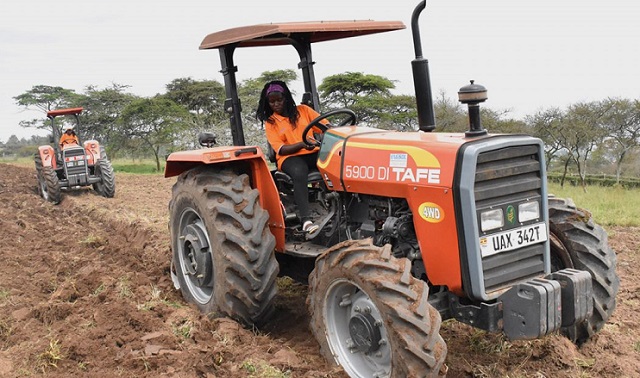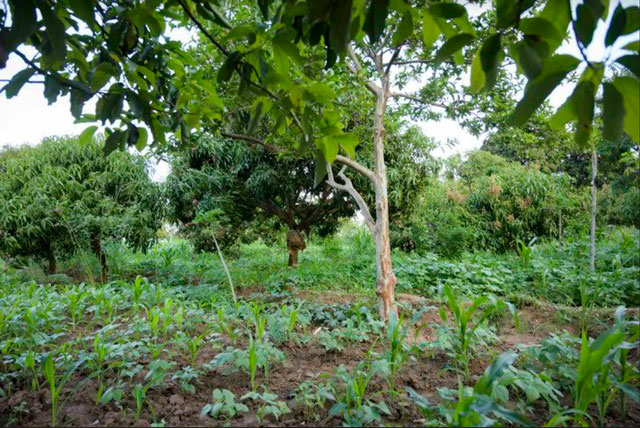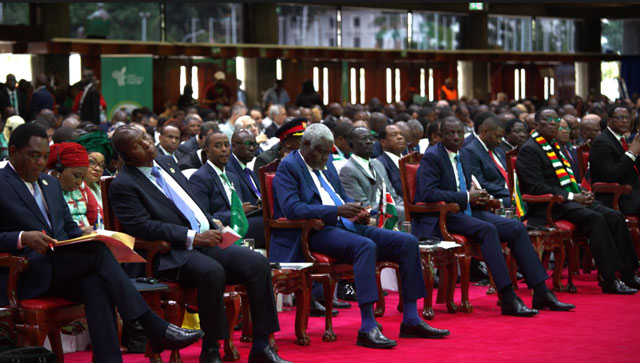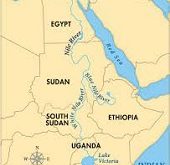
For Africa to feed its ever-growing population, govts must `listen to the soils’
ANALYSIS | RONALD MUSOKE | Africa’s soils upon which millions of smallholder farmers depend to grow food are dying and need urgent revival if they are to continue supporting the continent’s most important economic activity: agriculture.
That was one of the main takeaways from the Africa Fertiliser and Soil Health Summit held in Nairobi from May7-9 under the auspices of the Kenyan government and the African Union.
The summit which was held under the theme; “Listen to the Soil,” brought together over 4000 delegates including several heads of state and government, foreign ministers, agriculture ministers, development partners, researchers, the academia, businessmen, farmers and the media from across the continent.
They convened in Nairobi to evaluate the state of Africa’s fertiliser use and soil health but also reviewed the progress made since the 2006 Abuja Declaration, which aimed to boost fertiliser use for Africa’s agricultural growth.
The delegates heard that about 820 million and two billion people are both food and nutrition insecure, thanks partially to declining soil health.
According to the Coalition of Action for Soil Health (CA4SH), a global non-profit that works to improve soil wellbeing around the world, “soil health is the ability of the soil to sustain productivity, diversity and environmental services of terrestrial ecosystems.”
According to the coalition, when soils are healthy, for instance, one scoop of a teaspoon of healthy soil could host more biodiversity than there are humans on earth.
But what the delegates heard is that African soils are grappling with poor nutrient retention and therefore not being to nourish crops.

Uganda’s Minister of Agriculture, Animal industry and Fisheries, Frank Tumwebaze, who also doubles as the Chair of the AU Specialized Technical Committee on agriculture, rural development, water and environment noted that although in the past the perception that most African soils are highly fertile, constant cultivation over the years, without nutrient replenishment, has left most of them highly degraded.
Tumwebaze says the low capacity and knowledge by African small holder farmers on how to replenish the lost soil nutrients using organic, inorganic, and bio-fertilizer to sustain, rehabilitate and enhance soil fertility has made the situation worse.
Tumwebaze says the major question is how to balance our national need for food security, animal feed security, and environment sustainability and at the same time produce nutritious food.
“To achieve that positive balance, we have to pay attention to our soils because it’s the starting point for all other interventions,” he says, “We have to reverse the current trend of fertility loss estimated at 80kg of nutrients per hectare per year and equally work on strategies to minimize top soil erosion exacerbated by climate change.”
Tumwebaze noted that governments need to discuss and take actions that rejuvenate the continent’s soils, by agreeing on practices that will increase organic matter content in the soils, while also educating and encouraging African farmers to take-up tested and proven soil management practices applicable to local contexts.
Africa’s green revolution
The Nairobi summit happened almost 18 years since a similar summit took place in the Nigerian federal capital, Abuja. During that summit in Abuja, African leaders committed their governments to ramp-up fertiliser uptake on farms by at least 50kg/hectare per year as one of the ways of boosting agricultural productivity on the continent. However, fertiliser use remains low averaging about 18kg per hectare.
Kenyan President, William Ruto, noted that among the reasons Africa had made limited progress and remained heavily reliant on food imports following the Abuja declaration was the absence of nitrogen fertilizer production plants, due to high capital requirements. He said changing this requires “a common strategy, collective action, joint investment and logistical collaboration”.
“This transformation will shift our agricultural production from deficit to surplus,” he said.
Ruto told delegates that in 2022, Kenyan maize production was only 30 million bags against a normal production of 40 million bags. To turn this situation around, the Kenyan government decided to make inputs, especially fertiliser, more accessible and affordable.
“This initiative resulted in a harvest of 61 million bags of maize in 2023,” he said, “We achieved this by leveraging technology, utilising an integrated digital platform that registered over six million farmers.”

Dr. Paul Ronoh Kipronoh (PhD), Kenya’s Principal Secretary in the Ministry of Agriculture and Livestock Development noted that Kenya has achieved this commitment and stands at 55kg(nutrients)/ha as among the top 10% countries in Africa that have achieved this target.
Kenya looks forward in improving the fertilizer rates following the interventions from the implementation of Agricultural Soil Management Policy and the 10-year Action plan.
In 2024, under the national subsidy programme, the Kenyan government has distributed over 12.5 million 50Kg bags of fertiliser to farmers.
Dr. Kipronoh added that at the centre of data-driven agriculture is the profiling, mapping and registration of all farmers. For instance, between September and November 2023, the Ministry used Kenya Integrated Agriculture Management Information System (KIAMIS) to undertake registration of farmers where a total of 6.4 million farmers were registered.
The system, Dr Kipronoh said addresses data collection, central database management, data governance and data sharing and through strategic fertilizer application, farmers are expected to witness a 31% increase in maize production, from 61 million (90Kg) bags in 2023 to 80 million bags in 2024.
Enock Chikava, the Director, Agricultural Delivery Systems at Bill and Melinda Gates Foundation appeared to back the Kenyan president belief in fertiliser uptake saying quite often, for every one kilogramme of fertiliser a typical African farmer applies in their garden, they harvest just about 10kg of grain.
In the U.S or Europe, the same amount of fertilizer gives farmers returns of about 30kg of grain. “The difference between the 10kg of grain and the 30kg of grain generated by the same kilogramme of nitrogen fertilizer is what is called soil health,” Chikava said.
Many speakers at the summit including President Ruto were in agreement that in order to achieve Africa’s green revolution, large-scale subsidised fertiliser use is a necessary imperative.
But although fertilizers are estimated to contribute more than 30% of the crop yield, at a different forum during the same summit, Musalia Mudavadi, Kenya’s Prime Cabinet Secretary and Secretary for Foreign and Diaspora Affairs noted that fertilizer alone cannot sustain increased agricultural productivity and production.
“Observations (in Kenya) have been made that maize yields have stagnated despite increased fertiliser use; this has resulted in input bundling, emphasis on balanced nutrition and soil sampling and testing.”
Stefan Schulz, a programme manager of integrated soil fertility management at GIZ in Ethiopia told delegates on the sidelines of the summit that although there is no question that all across Africa, fertiliser intake needs to improve, there is need to make sure that emphasis is not placed on application of inorganic fertiliser which could end up contributing to soil nutrient mining.
“Fertiliser alone will not provide crop yield increases and the sustainability of food systems that we are looking for and working toward,” he said, “The importance of soil organic carbon (biomass) which needs to be returned to the soils is (equally critical).”
Going forward, the African leaders committed to reverse land degradation and restore soil health on at least 30% of degraded soil by 2034 through deploying innovative incentive mechanisms–including repurposing current subsidy programmes to encourage soil health investments by small holder farmers.
The leaders further pledged to promote integrated soil and water conservation, planning, and management practices across agricultural sub-sectors and landscapes/watersheds; promote investments in irrigation as part of integrated soil and water resource management for enhancing nutrient-use efficiency and climate change resilience, strengthen national, regional and international collaborative research and extension systems to tackle soil health challenges and improve the quality of support to smallholder farmers, promote organic agriculture practice to improve soil health alongside conventional agriculture.
Accelerating Africa’s soil health
On the sidelines of the summit, the African Union Development Agency-NEPAD, and the Norwegian government entered into a partnership aimed at enhancing soil health for sustainable food systems across Africa.
The AUDA-NEPAD is the AU’s development agency of the African Union mandated by Assembly of Heads of State and Government to coordinate and execute priority regional and continental projects to promote regional integration towards the accelerated realization of Agenda 2063.
The three-year programme is designed to support AU member States to implement the resolutions of the Africa Fertiliser and Soil Health Summit. The initiative aims to leverage policy, practice, and research to effectively manage soil health and advance agricultural sustainability in Africa.
Estherine Lisinge-Fotabong, the Director of Agriculture, Food Security, and Environmental Sustainability at AUDA-NEPAD, emphasized the importance of the partnership in facilitating the domestication of the summit resolutions by AU Member States. She expressed gratitude to the Government of Norway for its unwavering commitment to the African Agenda and, longstanding partnership with AUDA-NEPAD.
“Zero hunger was the first Sustainable Development Goal to halt and must be the first to get momentum again. Improving soil health to maximise yields is an essential part,” said Anne Beathe Kristiansen Tvinnereim, the Norwegian minister for international development.
“Tens of millions of people in Africa do not know when, and from where, they will get their next meal, causing serious ripple effects for the people directly affected but also the society as a whole, including the economy.”
Apparently, African countries import food worth US$ 75 billion every year and for countries to achieve food sovereignty, the soil needs to be repaired and improved, including more appropriate use of quality fertilizer.
“It starts with knowledge about the soil, and that is what this public-private partnership is all about,” said Tvinnereim. ‘The end goal is for African countries to be able to produce enough healthy and affordable food for their own population.”
The Norwegian support worth about NOK 33 million (Approx. US$3.1 million) will be used on capacity building for policymakers and farmers, as well as facilitating regional knowledge exchanges. Guidelines for instruments to enhance private sector investment in soil health is also part of the implementation support.
Part of Norway’s support is a financial contribution to the creation of an open digital platform on soil health. The new partnership between the international CGIAR research institute CIFOR-ICRAF and the private company Varda, aims to establish an open-source digital platform for soil information, SoilHive.
“For this action plan to be successful, it is paramount that regional bodies are involved and take charge,” said Tvinnereim.
 The Independent Uganda: You get the Truth we Pay the Price
The Independent Uganda: You get the Truth we Pay the Price


